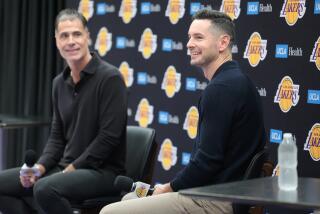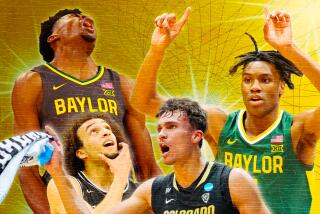The NBA : Owners, Players Are on Collision Course
- Share via
Of all the demands the NBA Players Assn. figures to make when its collective bargaining agreement with the owners expires after next season, perhaps the most unusual will be a proposal to abolish the collegiate draft.
Larry Fleisher, executive director of the players’ union, threw out that revolutionary idea last week only to have NBA Commissioner David Stern throw it right back at him.
“As a matter of principle, I would defend (Fleisher’s) right to have as long and extensive a wish list as he cares to bring to the table,” Stern told Newsday. “The draft and everything around it is an annual rite of renewal. The interest and excitement and hope it inspires is an important kind of thing.”
The response from Fleisher, who also is expected to seek a non-restrictive free-agent system, was equally predictable.
“We feel there is no reason why we can’t operate under a free-enterprise system, where a player can sign a contract and move wherever he wants, and a player can come out of school and sign with whomever he wants.
“Unfortunately, the world has built up this image that you must have a draft, and you have to have some sort of system of restraint.”
So much for Stern’s hope that the sides could start negotiations soon and hopefully resolve their differences and agree on a new contract by this summer.
As Clipper guard Junior Bridgeman, president of the players’ association, said: “Yeah, we’re going to try to throw everything out.”
Basically, that is the players’ plan. Back in 1983, they grudgingly agreed to the salary cap, which imposes limits on a team’s payroll, 53% of the league’s revenue and also a limited free-agent system.
But now that Stern has said that most of the league’s 23 teams are making money, and expansion is seriously being considered, the union position is that the salary cap is no longer needed.
“I don’t think (the owners) will go for it,” Bridgeman said. “The initial reaction to our free-agent and draft proposals has been negative.
“But we feel the draft used up its usefulness. The draft is supposed to bring parity, and it hasn’t. The argument they’ll bring up would be that the Lakers and Celtics would sign everyone.
“But look at a player like (Houston’s Akeem) Olajuwon. When he came out of college (in 1984), he probably wouldn’t have wanted to sign with the Lakers and sit on the bench for a few years.
“Not having a draft would be beneficial to teams like Indiana and Golden State. They could sign maybe two or three of the top players coming out of college, or guys whose contracts had run out.”
This much seems certain: Negotiations on a new collective bargaining agreement, whenever they begin, will be long and arduous.
Fleisher said: “I can see and project now that we’re going to have very, very difficult times.”
Some unpleasant news is bubbling out of the not-so-great Northwest, where both the Portland Trail Blazers and Seattle SuperSonics are slumping.
In Portland, the Trail Blazers’ 12-game losing streak ended last Saturday with a victory over the Houston Rockets, but the problems are far from over.
Last week, owner Larry Weinberg gave Coach Jack Ramsay a rather unconvincing vote of confidence, and there is continued speculation that Ramsay will be fired at the season’s end.
Meanwhile, there was grim news about the condition of fragile center Sam Bowie. He will undergo another operation to repair abnormalities in his left shin, which caused Bowie to miss two seasons at the University of Kentucky.
It is possible that Bowie’s career may be shortened because of his chronic leg problems. If so, the Trail Blazers probably will start wondering what they have to do to keep a center. They lost Bill Walton for an extended time--before Walton chose free agency--because of his foot problems.
In Seattle, the SuperSonics are 22-38 under first-year Coach Bernie Bickerstaff even though forward Xavier McDaniel has turned into the most productive rookie this season.
Veteran center Jack Sikma said over the weekend that he thinks the SuperSonics should trade him for young players or high draft picks. Boston will get Seattle’s first-round pick this season as part of the Gerald Henderson trade.
“I love Seattle,” Sikma said. “I’m going to live here the rest of my life, but a trade is a legitimate thing that has to be broached. If the Sonics could get some draft picks or some players, it’s something they have to explore.”
One intriguing comment made by baseball Commissioner Peter Ueberroth at his press conference announcing the penalties for drug offenders was a criticism of the NBA’s drug policy.
“I’m not here to analyze other sports, but there is no other sport with an effective drug program,” said Ueberroth, who pointed to Micheal Ray Richardson’s continued problems. “I’ve seen a lot of examples.”
Whereas Ueberroth is proposing random testing for all baseball players, the NBA can only test repeat drug offenders such as Richardson and Chicago’s Quintin Dailey. Instead of the NBA’s three-strikes-and-you’re-out plan, Ueberroth is giving the seven players who testified at the Pittsburgh trial only one chance.
Recently, Stern has heard a lot of criticism of the league’s policy. His response is always the same.
“We think the NBA program is very effective,” he said at last month’s All-Star game. “We get bad PR, but we like the way the agreement is working. . . . I’m quite confident we have the best after-care program that can be constructed.”
Two weeks ago in this space, it was reported that Philadelphia’s Andrew Toney was the only player of five--Michael Jordan, Darrell Griffith, Bill Cartwright and Frank Johnson are the others--who has been able to come back from foot injuries this season.
After three games, though, Toney complained of pain and again was sidelined. Over the weekend, he was given clearance to start working out again.
With all these foot problems surfacing, the Boston Herald consulted an expert--Bill Walton.
“Every time I read about it, I cringe,” Walton said. “Doctors would take the cast off, put another one on, take that off, put on another one. After a while, I started to think whether all this was just false hope.”
Utah Coach Frank Layden apparently thinks new shoes, especially new foreign-made shoes, might explain this rash of broken feet:
“Some players change their shoes every game, some every two or three games,” Layden said. “If they had to pay for them, I guarantee you they would make them last.
“Also, many of the shoes are made in foreign countries. I don’t think that’s in the best interests of the players. I think players would wear sandals if we’d let them, even if they were made in Bimini.”
It has been more than a year since Houston guard John Lucas has returned from his second drug rehabilitation stay under the NBA’s policy, but he says he still feels he has something to prove to his teammates.
“I felt responsible for what happened last year,” said Lucas, referring to the Rockets’ first-round playoff ousting by Utah. “I said before the season I wanted to pay the fans and the team back. I can only do that by helping the team do well.”
Lucas’ teammates don’t feel the same way.
“We don’t hold him accountable,” forward Robert Reid said. “We still had 12 players and we didn’t get the job done. . . . More than anything, we’ve seen John’s pride as a man and a basketball player push him to recognize he had a problem and take care of it.”
More to Read
Go beyond the scoreboard
Get the latest on L.A.'s teams in the daily Sports Report newsletter.
You may occasionally receive promotional content from the Los Angeles Times.







